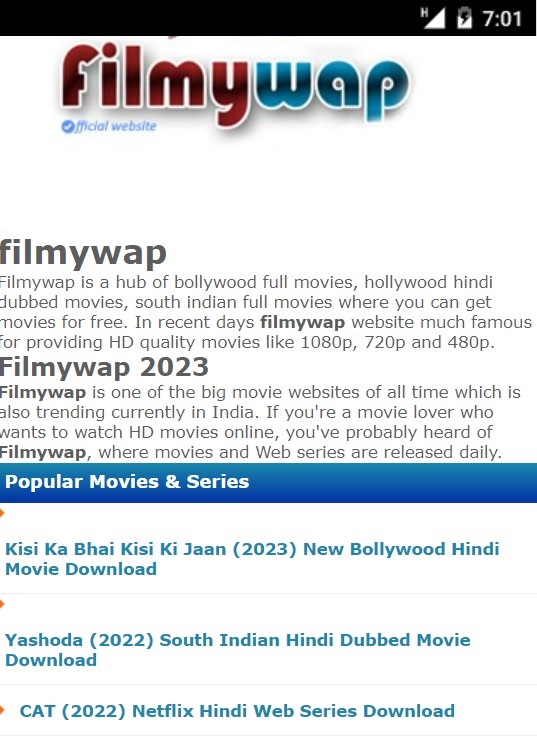Filmywap & "We Did Not Find Results": What You Should Know
In an age where entertainment is paramount and accessibility often trumps legality, does the allure of free content justify the ethical compromises involved? The proliferation of piracy websites like Filmywap presents a significant challenge to the entertainment industry, raising critical questions about copyright infringement, revenue loss, and the future of content creation.
Filmywap, a notorious name in the digital piracy landscape, has become synonymous with unauthorized distribution of copyrighted material. Functioning as an illegal platform, it specializes in leaking a wide array of films and television shows across various languages and genres. Bollywood, Hollywood, Punjabi, Tamil, Telugu, and Kannada movies are all vulnerable to being unlawfully disseminated on this platform, often in high-definition quality. The site’s operations directly contravene copyright laws, resulting in substantial financial losses for film producers, distributors, and other stakeholders in the entertainment industry.
| Category | Information |
|---|---|
| Website Name | Filmywap (and related domains like Filmy4wap, Filmyfly) |
| Type | Piracy Website |
| Content Leaked | Bollywood, Hollywood, Punjabi, Tamil, Telugu, Kannada movies, TV shows, web series |
| Content Quality | HD (High Definition) |
| Accessibility | Free Download |
| Legal Status | Illegal |
| Impact | Copyright infringement, financial loss to the entertainment industry |
| Related Terms | Filmy4wep, Filmy4wap, Filmy4web, Filmyfly |
| Reference | U.S. Copyright Office (This link provides general information about copyright laws.) |
The modus operandi of Filmywap revolves around illegally obtaining copies of films and TV shows, often shortly after their theatrical release or digital premiere. These pirated copies are then uploaded to the platform, making them available for free download to a global audience. This unauthorized distribution undermines the legitimate channels through which content creators and distributors seek to monetize their work. The impact is felt across the entire entertainment ecosystem, from major studios to independent filmmakers.
- Kalinga Hindi Dubbed Movie Download Your Ultimate Guide To Watch And Enjoy
- Sky Movie Hd In 2024 Your Ultimate Guide To Stream Movies Like A Pro
One of the key reasons for Filmywap's popularity is its user-friendly interface. The site is designed to make browsing, searching, and downloading movies and series easy. It caters to a wide demographic, offering content in multiple languages to appeal to diverse audiences. This accessibility, coupled with the promise of free entertainment, makes Filmywap an attractive option for users who may not be able or willing to pay for legitimate streaming services or cinema tickets.
Filmywap is not an isolated case; it is part of a larger network of piracy websites that operate globally. These platforms often employ sophisticated techniques to evade detection and legal action. They frequently change domain names, use proxy servers, and operate from countries with lax copyright enforcement to maintain their operations. This cat-and-mouse game between copyright holders and piracy websites is an ongoing challenge that requires constant vigilance and innovative solutions.
The legal consequences of using piracy websites like Filmywap are often overlooked by users. Downloading or streaming copyrighted material without permission is illegal in most countries and can result in fines, legal action, or even criminal charges in some cases. Furthermore, accessing these sites can expose users to malware, viruses, and other security threats. Piracy websites are often poorly regulated and may contain malicious software that can compromise users' devices and personal information.
- Watch Vegamovies Online Your Ultimate Guide To Streaming Bliss
- Hindi Filmywap Your Ultimate Guide To Bollywood Movies And Entertainment
The entertainment industry has been actively combating piracy through various means, including legal action, technological measures, and public awareness campaigns. Copyright holders regularly file lawsuits against piracy websites and their operators, seeking to shut down these illegal platforms and recover financial losses. Technological solutions, such as digital watermarking and content protection systems, are also employed to prevent unauthorized copying and distribution of films and TV shows.
Public awareness campaigns play a crucial role in educating consumers about the ethical and legal implications of piracy. These campaigns aim to highlight the negative impact of piracy on the entertainment industry and to promote legitimate alternatives for accessing content. By raising awareness and changing consumer behavior, these campaigns can help to reduce the demand for pirated content and support the growth of legal streaming services and other legitimate platforms.
The rise of legal streaming services has provided consumers with a convenient and affordable way to access a vast library of films and TV shows. Platforms like Netflix, Amazon Prime Video, Disney+, and others offer a wide range of content for a monthly subscription fee. These services have become increasingly popular in recent years, providing a viable alternative to piracy and supporting the growth of the entertainment industry.
However, the fragmentation of the streaming landscape has also contributed to the problem of piracy. With multiple streaming services vying for subscribers, consumers may find it necessary to subscribe to several platforms to access all the content they want to watch. This can be expensive and inconvenient, leading some users to turn to piracy as a way to access content without paying for multiple subscriptions.
The fight against piracy requires a multi-faceted approach that involves legal action, technological solutions, public awareness campaigns, and the availability of affordable and convenient alternatives for accessing content. By working together, copyright holders, technology companies, governments, and consumers can help to reduce the demand for pirated content and support the growth of a vibrant and sustainable entertainment industry.
Moreover, the discussion around piracy often needs to be reframed to focus on the value proposition of legitimate content. Instead of solely emphasizing the illegality of piracy, highlighting the benefits of supporting creators and accessing high-quality, secure content through legal channels can be more persuasive. This includes emphasizing the superior viewing experience offered by legitimate platforms, the absence of malware risks, and the assurance that creators are being fairly compensated for their work.
Another critical aspect is addressing the root causes of piracy. For some consumers, especially in developing countries, the high cost of legal content is a significant barrier. Offering more affordable subscription options, regional pricing models, and flexible payment plans can make legitimate content more accessible and reduce the incentive to turn to piracy. Additionally, ensuring that legal platforms offer a diverse range of content that caters to different cultural tastes and preferences is essential for attracting a wider audience.
The role of internet service providers (ISPs) in combating piracy is also a subject of ongoing debate. Some argue that ISPs should be more proactive in blocking access to piracy websites and implementing measures to prevent the distribution of copyrighted material. However, this raises concerns about net neutrality and the potential for censorship. Finding a balance between protecting copyright and preserving the open nature of the internet is a complex challenge that requires careful consideration.
Education is a powerful tool in the fight against piracy. By teaching young people about copyright law, the ethical implications of piracy, and the importance of supporting creators, we can help to cultivate a culture of respect for intellectual property. Schools, universities, and community organizations can play a vital role in delivering this message and shaping the attitudes of future generations.
Furthermore, the entertainment industry can explore new business models that offer consumers more flexibility and control over their content consumption. Options such as pay-per-view, digital rentals, and ad-supported streaming services can provide alternatives to traditional subscription models and appeal to a wider range of consumers. By experimenting with different pricing and distribution strategies, the industry can find new ways to monetize content while also making it more accessible.
The fight against piracy is an ongoing process that requires continuous adaptation and innovation. As technology evolves and consumer behavior changes, the strategies for combating piracy must also evolve. By embracing a holistic approach that combines legal action, technological solutions, public awareness campaigns, and innovative business models, we can work towards a future where content creators are fairly compensated for their work and consumers have access to a wide range of affordable and convenient entertainment options.
Moreover, the global nature of piracy necessitates international cooperation. Copyright laws vary from country to country, and piracy websites often operate across borders, making it difficult to enforce copyright protections. International treaties and agreements can help to harmonize copyright laws and facilitate cross-border enforcement efforts. Collaboration between governments, law enforcement agencies, and copyright holders is essential for effectively combating piracy on a global scale.
The debate around piracy also touches on broader issues of digital rights and access to information. Some argue that strict copyright laws can stifle creativity and innovation by limiting the ability to remix, adapt, and build upon existing works. Finding a balance between protecting copyright and promoting creativity is a delicate task that requires careful consideration of the public interest.
In conclusion, the issue of piracy, exemplified by platforms like Filmywap, is a complex and multifaceted challenge that requires a comprehensive and collaborative approach. By addressing the root causes of piracy, promoting legal alternatives, raising public awareness, and fostering international cooperation, we can work towards a future where content creators are fairly compensated for their work and consumers have access to a wide range of affordable and convenient entertainment options. The key lies in recognizing that piracy is not just a legal issue but also an ethical, economic, and social one, requiring a nuanced and holistic response.
- Kevin Kimmel The Man Who Turned Passion Into Success
- Unveiling Filmy4web Com Download Hindi Your Ultimate Guide To Hindi Movie Downloads

Filmywap A Popular but Risky Platform for Free Movie Downloads Delhi

New Movies Coming In 2025 A Cinematic Odyssey Penelope J. Burke

FilmyWap 2025 , New Bollywood Movie, Web Series Free Download at www